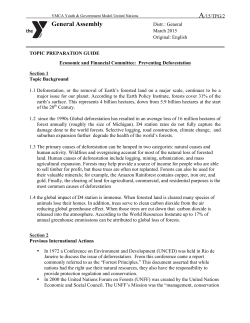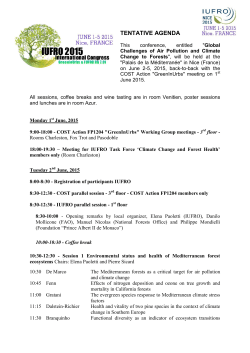
EFIMED presentation - IV Mediterranean Forest Week
Innovation in Title Mediterranean forests Subtitle or how to scape the paradox Author Inazio Martinez deEntity Arano EFIMED Mediterranean Forests 80 M ha (9% land) Water limited High altitudinal gradients Shaped by fire Low productivity High biodiversity Oak/pines/eucalypts Mediterranean Forest are complex socio-ecosystems Castello del Buonconsiglio, Trento in year 1,400. Wenceslas Cobergher Mediterranean Forests: a source of richness Wood trade in the mediterranean IV-I Century BC. (cited in M. Williams 2013) Mediterranean Forests: Timber trade in medieval Muslime Mediterranean VII-XI siecles. (cited in M. Williams 2013) Mediterranean Forests: resilient and productive The Siege of Nice by Khayr ad-Din in 1543 Matrakci Nasu, 16th century Deforestaion peaked after the industrial revolution with long lasting ecological and cultural consequences. Almost a quarter of Morocco’s forests (10,000 km2) vanished between during the protectorate in the XX century. In the Tunisian mountains, forest cover shrank by one-third between 1919 and 1960 (Brandt and Thornes 1996). G. Agricola. A philosophical treatise on husbandry 1721 Food for thought Mediterranean Forest in the cross-road • • • • • • Globalisation Societal change Low carbon economy Climate change Biodiversity wellbeing The Paradox: as Mediterranean forests become increasingly valuable, our societes are less able to materialise those values and manage them sustainably” Forestry in across-road • Biodiversity Conservation Algerian nuthatch (Sitta ledanti) Levaillant's woodpecker (Picus vaillantii) Forestry in across-road • Climate Change: « The bioeconomy » • Forestry in across-road Globalisation, population growth, consumption • Forestry in across-road Globalisation, population growth, consumption Mediterranean Forests: societal change • • • High population (480 Million inhabitants) 66% of people lives in cities 30% of world tourism!! Urban populations can affect distant forests. • • • • • demand for wood-fuel water, food waste disposal and Recreation Well-being Myers 1994 Mediterranean Forests: human pressure Rural abandonment in the north Growing rural populations in the south Low density rural population can affect forests. • Burning • Grazing Stedman-Edwards • Mining… 1997 Forestry in the cross-roads: social values license to operate, license to PES Consume behaviour Mediterranean Forests: Fragmentation European Forest Institute EFI Castilla and Leon 1.000.000 owened by 700.000 thousen owners 25 02 April 2015 Climate change adaptation Trend: area burnt in WE Trend: area burnt in Argelia … and in the near future? • France has calculated that it needs to increase 20% the fire suppression budget by 2040. • Who pays? Where is the limit? any alternatives? mission interministérielle Changement climatique et extension des zones sensibles aux feux de forêt, 2010 The paradox in practice: Catalunya Low Management Fire Risk Water Connection Tourisme connection Carbon connection Fire Combat Lack of investment In a context of increased demand for forest goods, captured value by “local”population is low!! No-Management in the North, leading to megafires Pressures to land use change and degradation in the South Despite their high values, mediterranean forests are a “problem,” and a sink of public resources Fire-combat uses enormous budgets + Protecting natural areas takes a big share of efforts Fragmented value chains Lack of investments and entrepreneurship As forests become more relevant to different policy sectors, forest governance gests incresingly weaker Influenced by multiple sectorial policies Lack of holistic, shared vision Int. arena an example UNFCCC / CBD / UNFCD Innovating to create value Change in mind setting: Mediterranean forests a source of richness: from trade-offs to synergies Generating and connecting Value chains on Wood and NWFPs on Ecosystem Services Partnerships with local actors for fuel reduction through grazing / mechanical fuel reduction/ NWFP… Developing added value local value chains Wood construction with Mediterranean pines! Using wisely the window of opportunity of bio-energy A new way to develop knowledge Increase the co-generation of legitimate, relevant, timely, useful, applicable knowledge. Increasing the science-policy-practice dialogue to answer not only a) what to do? But also Who? and how?, with what means? merci!! 43 20.8.2004
© Copyright 2025












